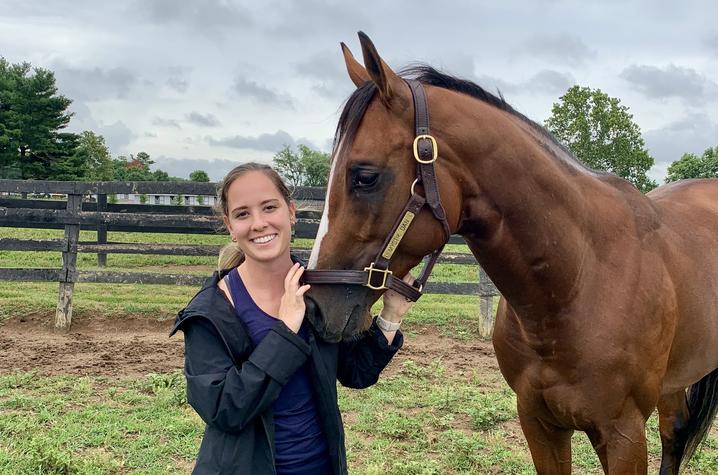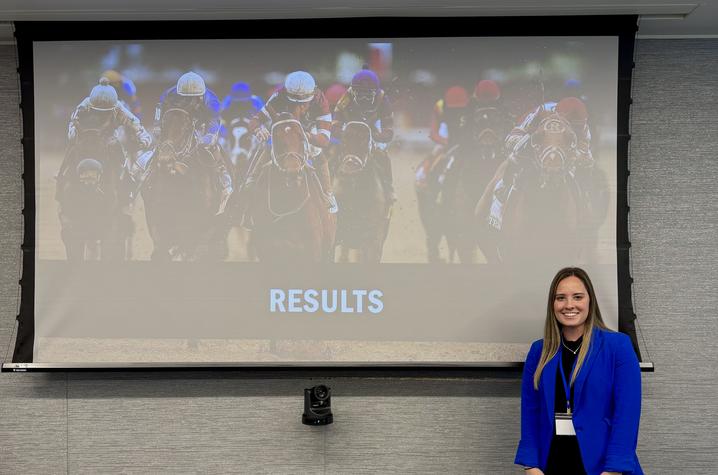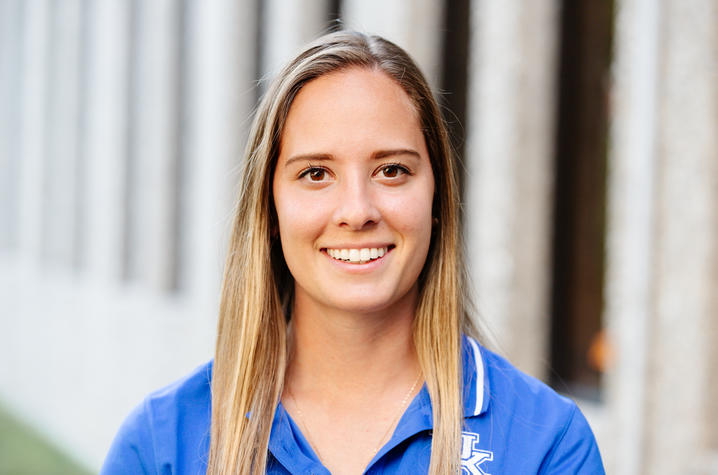UK study focuses on improving jockeys’ mental health after injury
LEXINGTON, Ky. (May 1, 2025) — Jockeys are some of the most passionate, fearless people in the horse racing industry, but like any sport, injuries can happen.
Most athlete populations have little trouble finding literature on how emotion management, coping strategies and moral support impacts athletes after an injury. When it comes to the horse racing industry, research on the psychological effects of injuries on jockeys is lacking
Kelley Renner is a graduate student at the University of Kentucky completing her master’s degree in sport and exercise psychology in the College of Education. Through her interest in working with jockeys and the horse racing industry, Renner began exploring the effects of injury on this group of athletes.
This spring, she presented her master’s thesis, “The Psychological Impacts in Exercise Riders and Professional Jockeys Following Injury.”
“I’ve always had an interest in post-injury experience and a passion for the equine industry, so I decided to combine the two,” Renner said. “One of my core values is compassion, and if I can help people with something, even if it’s just 1%, I want to try to do that. Not a lot of horse racing spectators know the ins and outs behind the scenes of what really goes on. So, I wanted to bring awareness to this group of athletes.”
The goal of her thesis is to begin unpacking this area that is underrepresented in research, specifically looking at the psychological effects jockeys face after an injury.
Renner conducted semistructured interviews with jockeys to gather information on specific emotions associated with post injury, coping strategies they use when facing an injury, what kind of support system they have and what they go through during the return to ride process.
From her analysis she created a model that outlines the athlete’s journey when it comes to the mental impact. In traditional athletes, post-injury, there is a timeline of when the injury occurs, to the recovery period and being cleared to return to the sport. She used this timeline as a guide for her model.
“Based off the themes in the traditional athlete injury timeline, that’s where I aligned the emotions that were specifically involved with each stage of injury occurrence,” Renner said. “So, for each phase of the timeline I explored the emotions the jockeys felt. For example, during the recovery phase, how might the emotions look different for jockeys compared to traditional athletes.”
Some of the most common injuries jockeys face are concussions, muscle tears or strains, shoulder dislocation and broken bones.
“What we know is a lot of them will try to hide their injuries,” said Michaela Keener, Ph.D., an assistant professor in the Sports Medicine Research Institute, Equestrian Athlete Initiative faculty in the UK College of Health Sciences and committee member for Renner’s thesis. “There’s a lot of pressure for them to return to riding, even if they are not feeling 100%. Racing is their livelihood to support themselves and often their families. They have a lot of pressure to get back on the horse a little too early.”
In general, the horse racing business can be very strict and demanding. It’s a competitive industry, it can cause a lot of stress and fear among the riders that they can be replaced at any moment.
“I’m feeling very mad, mad because they don’t care. They replace you very soon. You have an accident, and the next day another person is going to be over there. Nobody called. Nobody’s asking how you’re feeling,” said one of the jockeys who participated in the interview.
Renner’s analysis explains that a lot of these athletes come from outside of the United States, so most of the time they don’t have a support system nearby to lean on. The jockeys told her this is something they struggle with.
The athletes have a lot of powerful emotions, but with the lack of support feel like they have no one to talk to about it.
During her interviews, Renner asked the jockeys how they coped when an injury occurred, and sadly, suicidal thoughts were mentioned.
“I had one participant admit to attempting suicide once, so it’s important for people to grasp the severity of the situation here,” Renner said. “This is why we must research, advocate for the jockeys and provide resources.”
Although suicide is at the very extreme, it happens in the horse racing world more than people would think.
“Sometimes people who go to Keeneland and watch the pretty racehorses run just don’t know what’s happening behind the scenes,” said Ashley Samson, Ph.D., a professor in the Department of Kinesiology and Health Promotion in the College of Education and chair for Renner’s thesis. “We aren’t trying to paint a horrible picture, but it’s not always pretty, and that's the reality.”
Uniquely, Renner found that this group didn’t necessarily have a fear of reinjury, but instead, they mentioned being afraid that they might develop an anxiety around riding or racing.
“It’s the fear of having fear,” Renner said. “They know that if they are fearful, they cannot speak up about it, they feel like they must hide it. People are always told if you’re afraid to get on the horse, you should not get on that horse. But these athletes have a lot of pressure, so they feel like they have to regardless of if they have that gut feeling.”
They feel as though they don’t have a choice and must get on the horse to make their livelihood. The jockeys explained in their interviews that they don’t have anyone to talk to when they feel these emotions.
The culture of horse racing has a stigma around expressing feelings of mental health struggles. There is an unspoken rule that they shouldn’t talk about it, push it down and get back up on the horse.
Renner hopes that with her research, she can help with breaking the stigma and ensuring jockeys and other members of the industry have all the resources they need when it comes to taking care of their mental health.
“It’s a very difficult sport,” said another jockey who participated in the interview. “Mentally, this sport can drain you because you could be on top of the sky today, and tomorrow you’re only as good as your last race.”
Renner asked if any of the jockeys had experience in receiving help for their mental health or mental performance. Three out of four said no, they never have, but they all agreed that it would’ve been helpful if they would’ve had someone to talk to.
“The emphasis there is that we know that they want the help,” Renner said. “They are ready for it. It’s just the challenge of how we combat the stigma, the barriers and getting over that.”
Her data only focuses on four jockeys so far, but she feels confident that if she is able to gather more research from larger groups of jockeys, she can help them even more.
“With this research, Kelley is on the brink of something that can change the industry,” Keener said. “The Horseracing Integrity Safety Authority has recently worked with the Jockeys’ Guild to provide jockeys with 24-hour access to mental health services. As we see these resources become more available hopefully, more people will also be willing to talk to Kelley about their experiences.”
As more resources are offered to the athletes, their hopes are to begin to see a shift in the stigma around jockey mental health.
“The public needs to be more aware of these athletes, they’re often overlooked,” Renner said. “We can’t forget that these riders are human, it is a real person riding the horse. They all have a passion for riding, it’s what they love to do.”
Renner will continue to research and advocate for these athletes as she completes her master’s degree and will remain at UK to pursue her doctorate degree.
As the state’s flagship, land-grant institution, the University of Kentucky exists to advance the Commonwealth. We do that by preparing the next generation of leaders — placing students at the heart of everything we do — and transforming the lives of Kentuckians through education, research and creative work, service and health care. We pride ourselves on being a catalyst for breakthroughs and a force for healing, a place where ingenuity unfolds. It's all made possible by our people — visionaries, disruptors and pioneers — who make up 200 academic programs, a $476.5 million research and development enterprise and a world-class medical center, all on one campus.







